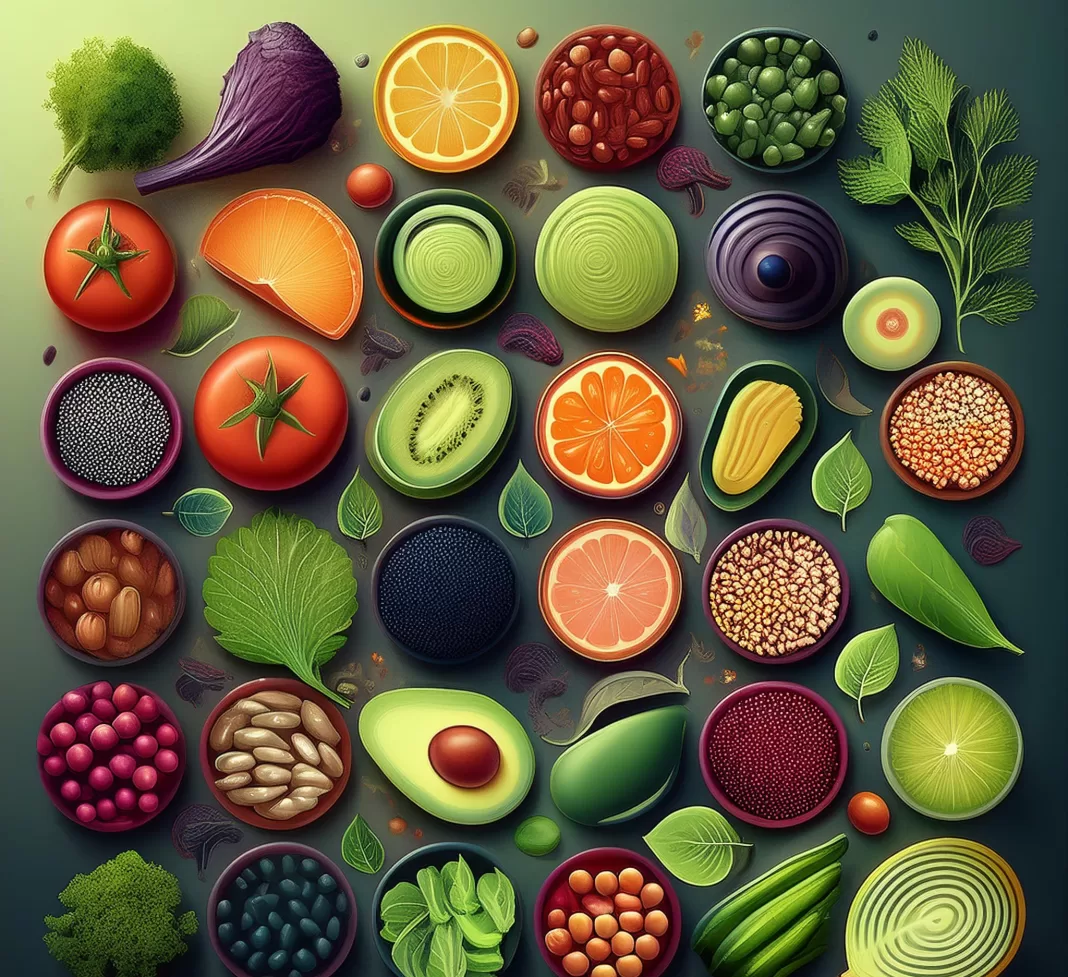Introduction of Micronutrients:
Micronutrients are vitamins and minerals that are necessary in small amounts for normal metabolism, growth and physical well-being. These nutrients also have a significant impact on overall health and disease prevention.
Different Kinds of Micronutrients:
Vitamins:
- Vitamin A
- Vitamin C
- Vitamin D
- Vitamin E
- Vitamin K
- B vitamins
Minerals:
Roles:
- Vitamins: Immune system support, energy generation as well as restoration of cells.
- Minerals: Helping with bone health, nerve function and muscle contraction.
Essential Micronutrients – Vitamins:
These are organic compounds that take part in various metabolic processes. They promote energy production, immune function and maintenance of cells. Each vitamin has specific roles and sources.

- Vitamin-A: Supports eyesight and the immune system. Discovered in carrots, sweet potatoes and spinach.
- Vitamin-C: Antioxidant helpful for tissue repair. Can be found in citrus fruits, strawberries or bell peppers.
- Vitamin-D: Boosts calcium absorption as well as bone health. It is obtained from sunlight, fortified milk or fish sources.
- Vitamin-E: Protects cells against oxidative damage. Found in nuts such as almonds; seeds like sunflower seed oil and green leafy vegetables such as spinach.
- Vitamin-K: Necessary for blood clotting process to occur normally within our bodies. This vitamin can be sourced from kale, Brussels sprouts or other leafy greens.
Main Sources of Vitamins:
Vitamin-A:
- Animal sources: Liver, eggs, butter and fish oils.
- Plant sources: Carrots, sweet potatoes, spinach and kale.
Vitamin-B:
- Thiamine: Whole grains pork legumes.
- Riboflavin: Milk cheese green leafy vegetables.
- Pyridoxine (B6): Poultry fish potatoes noncitrus fruits.
- Cobalamin (B12): Meat dairy products fortified cereals.
Vitamin-C:
- Primary sources: Citrus fruits strawberries bell peppers broccoli.
Vitamin-D:
- Animal sources: Fatty fish liver egg yolks.
Vitamin-E:
- Sources: Nuts,seeds,green leafy,vegetables,vegetable’s oils.
Vitamin-K:
- Sources: Wheat germ,whole grains,brown rice,oats unrefined,cereal grain.
Minerals: Important Micro-Nutrients & Where to Find Them:
Minerals are important for good health and preventing deficiencies. Key minerals include calcium, iron, magnesium, potassium, zinc and selenium.
Functions of Key Minerals, Micronutrients:
- Calcium: Helps build strong bones and teeth,supports muscle function.
- Iron: Essential component of hemoglobin,carries oxygen in the blood.
- Magnesium: Required for energy metabolism,regulates muscle and nerve function.
- Potassium: Works with sodium to maintain fluid balance in cells; helps transmit nerve impulses.
- Zinc: Needed for normal growth and development,supports immune system function.
- Selenium: Protects cells from damage caused by free radicals,helps regulate thyroid hormone activity.
Food Sources:
- Calcium: Dairy products (milk, cheese),dark green leafy vegetables (kale, spinach).
- Iron: Lean meat (beef),poultry (chicken, turkey),fish (salmon).
- Magnesium: Nuts (almonds),seeds (pumpkin, sunflower),whole grains (oatmeal).
- Potassium: Bananas,oranges,potatoes (baked with skin).
- Zinc: Beef,pork,oysters.
- Selenium: Brazil nuts,tuna fish sandwich on whole wheat bread with lettuce and tomato yum!
Antioxidants – What They Do for Us!
Antioxidants help neutralize free radicals which can cause cellular damage leading to chronic disease like cancer or heart disease. Some common antioxidants you may have heard about are:

- Vitamin C: Found in citrus fruits such as oranges or grapefruit also red peppers strawberries kiwi fruit pineapple guava papaya mangoes cantaloupe watermelon raspberries blueberries blackberries cranberries pomegranates cherries etcetera etcetera!
- Vitamin E: Found in almonds sunflower seeds spinach avocado oil olive oil wheat germ oil hazelnuts peanut butter kale collards turnip greens Swiss chard tomatoes kiwi fruit papaya mangoes etcetera!
- Beta-carotene: Found in carrots sweet potatoes kale spinach collards mustard greens red bell peppers yellow bell peppers orange bell peppers green bell peppers etcetera!
- Selenium: Found in Brazil nuts beef liver sunflower seeds brown rice whole wheat bread tuna fish sandwich on whole wheat bread! Haha just kidding about the tuna fish sandwich I love you mom!
These antioxidants help support immune function, skin health and reduce inflammation. They can also lower risk of heart disease, cancer or neurodegenerative disorders like Alzheimer’s.
Phytonutrients, Micronutrients: Plants Have Nutrients Too!
Phytonutrients are natural compounds found in plants that have been shown to offer various health benefits. Unlike vitamins or minerals they are not considered essential for life but can still provide important support for overall well-being.
Different Types of Phytonutrients:
- Carotenoids: Such as lutein, zeaxanthin and beta-carotene which promote eye health and may help prevent age-related macular degeneration (AMD).
- Flavonoids: Found in fruits like blueberries or grapes, vegetables like broccoli rabe (rapini) or onions, tea especially green tea! Flavonoids have anti-inflammatory properties as well as antioxidant activity.
- Glucosinolates: A group of phytochemicals present in cruciferous vegetables such as cabbage family plants including Brussels sprouts, cauliflower, kale, collard greens etcetera! Glucosinolates may help protect against certain cancers like breast cancer or lung cancer.
- Phytoestrogens: These are plant compounds that can act like estrogen in the body thus mimicking its effects. For example isoflavones found predominantly in soy products such as tofu or tempeh have been shown to support hormonal balance during menopause among other things.
Benefits:
- Antioxidant Effects: Protect cells from damage.
- Immune Support: Enhance the body’s defense mechanisms.
- Anti-inflammatory: Reduce chronic inflammation markers.
Eating a rainbow of colors when it comes to fruits and vegetables ensures you get a nice mix of these beneficial phytonutrients.
The Role of Micronutrients in Immune Function:
Micronutrients have crucial functions in supporting a strong immune system. The main vitamins and minerals involved are:
- Vitamin C: Supports cellular activities of both innate and adaptive immunity.
- Vitamin D: Amplifies pathogen-fighting abilities possessed by monocytes and macrophages.
- Zinc: Necessary for normal development and functioning of cells that mediate innate immunity.
- Iron: Lack thereof impairs the capacity to fight infections greatly within the body.
- Vitamin A: Ensures structural as well as functional integrity among mucosal cells located at innate barriers.
Inadequate supply for these micronutrients can lead to weakened defense against infections hence high vulnerability rates become experienced .
Micronutrients and Cognitive Health:
These nutrients play an important role in maintaining or boosting cognitive functioning while at it , protecting neurons from oxidative stress gets done too.
- Omega-3 Fatty Acids: Brain structure-supportive substances found abundantly within oily fish like salmon or walnuts.
- Vitamin B12: Animal protein sources including meat , eggs plus dairy products also fortified cereals should be consumed regularly since this vitamin helps with nerve function alongside cognitive performance improvement.
- Antioxidants: Vitamins C & E found mainly in fruits serve brain cell’s protection purpose against damage caused by free radicals during metabolism reactions occurring within them over time.
- Iron: Spinach , legumes (beans) , red meat among others have good amounts of this mineral which enhances cognitive abilities through oxygen delivery enhancement within the brain.
Micronutrients for Bone and Joint Health:
Several essential micronutrients are required by the human body to maintain optimal bone density & joint function where all these elements together facilitate stable skeletal structure as well as mobility.
Key Micronutrients:
- Calcium: This nutrient is vital for strong bones hence it should be included in diets through consumption of dairy products like milk , cheese or yoghurt among other sources such as green leafy vegetables including fortified ones too.
- Vitamin D: Calcium absorption is supported by this vitamin and can be obtained from sunlight exposure , fatty fish (tuna) plus fortified foods like margarine spreads onto breads etcetera.
- Vitamin K: Bone metabolism depends greatly on presence thereof thus individuals need intake from dietary sources such as kale , spinach leaves et cetera alongside broccoli florets which are rich in it too.
- Magnesium: Bones need enough amounts so that they may form properly therefore nuts e.g almonds where lots exist will help meet daily requirements easily just like seeds such as pumpkin which also contain plenty thereof.
- Phosphorus: It works hand-in-hand with calcium thereby complementing each other’s roles regarding maintenance of healthy bones thus meats (beef), dairy products including cheese plus nuts should always feature prominently among food choices made by people aiming for such outcome.
These nutrients are specifically involved in preservation of normal bone mass whilst promoting adequate joint lubrication which ensures soundness stability throughout life span especially during old age when these systems tend to become weaker due to wear tear effects caused by aging process itself besides other factors influencing their health status negatively over time.
How to Incorporate Micronutrient-rich Foods into Your Diet:
- Start with Breakfast: Make smoothies using berries, bananas, and leafy greens.
- Snack Wisely: Opt for nuts, seeds or yogurt instead of processed snacks.
- Color Your Plate: Add different vegetables to meals, focusing on bright and diverse colors.
- Choose Whole Grains: Substitute white rice and bread with options like quinoa or brown rice which are whole grain varieties having numerous benefits nutritionally speaking since they contain more fiber among other nutrients required for good health maintenance purposes by human beings generally speaking.
- Lean Proteins: Include fish, lean meats as well plant-based sources like lentils and chickpeas within your daily intake plans in order to obtain necessary amounts easily without excessive fat intake from these food choices made regularly over time span considered.
- Fortified Foods: Consider taking fortified cereals alongside dairy products such as milk so that there will be added vitamins minerals needed by the body especially during periods when it may not get enough through normal dietary means alone hence this becomes an important strategy worth considering seriously.
- Stay Hydrated: Take water infused with minerals including those having calcium plus magnesium content if possible because hydration is also key towards overall wellbeing both inside outside our bodies too!
Conclusion: The Importance of a Balanced Micronutrient Intake:
For general health, a person needs to have enough of each type of micronutrient. These substances — among which are vitamins and minerals — have different important functions including but not limited to:
- Immune System Support: Strengthening the body’s resistance against diseases.
- Energy Generation: Helping transform food into fuel.
- Bone Strength Maintenance: Keeping the structure and health of bones intact.
- Brain Function Improvement: Enhancing mental performance and clarity.
- Cell Shielding: Acting as antioxidants that safeguard cells from harm.
Too little or too much intake may cause problems. Thus, it is vital that we eat various kinds of nutritious foods so as to get all required amounts thereby promoting good health.

